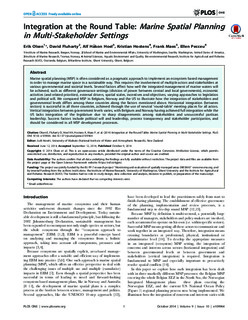| dc.contributor.author | Olsen, Erik | |
| dc.contributor.author | Fluharty, David | |
| dc.contributor.author | Hoel, Alf Håkon | |
| dc.contributor.author | Hostens, Kristian | |
| dc.contributor.author | Maes, Frank | |
| dc.contributor.author | Pecceu, Ellen | |
| dc.date.accessioned | 2014-10-29T14:34:08Z | |
| dc.date.available | 2014-10-29T14:34:08Z | |
| dc.date.issued | 2014-10-09 | |
| dc.identifier.citation | Olsen E, Fluharty D, Hoel AH, Hostens K, Maes F, et al. (2014) Integration at the Round Table: Marine Spatial Planning in Multi-Stakeholder Settings. PLoS ONE 9(10): e109964. doi:10.1371/journal.pone.0109964 | nb_NO |
| dc.identifier.issn | 1932-6203 | |
| dc.identifier.uri | http://hdl.handle.net/11250/225003 | |
| dc.description.abstract | Marine spatial planning (MSP) is often considered as a pragmatic approach to implement an ecosystem based management in order to manage marine space in a sustainable way. This requires the involvement of multiple actors and stakeholders at various governmental and societal levels. Several factors affect how well the integrated management of marine waters will be achieved, such as different governance settings (division of power between central and local governments), economic activities (and related priorities), external drivers, spatial scales, incentives and objectives, varying approaches to legislation and political will. We compared MSP in Belgium, Norway and the US to illustrate how the integration of stakeholders and governmental levels differs among these countries along the factors mentioned above. Horizontal integration (between sectors) is successful in all three countries, achieved through the use of neutral ‘round-table’ meeting places for all actors. Vertical integration between government levels varies, with Belgium and Norway having achieved full integration while the US lacks integration of the legislature due to sharp disagreements among stakeholders and unsuccessful partisan leadership. Success factors include political will and leadership, process transparency and stakeholder participation, and should be considered in all MSP development processes. | nb_NO |
| dc.language.iso | eng | nb_NO |
| dc.publisher | Public Library of Science | nb_NO |
| dc.rights | Navngivelse 3.0 Norge | * |
| dc.rights.uri | http://creativecommons.org/licenses/by/3.0/no/ | * |
| dc.title | Integration at the Round Table: Marine Spatial Planning in Multi-Stakeholder Settings | nb_NO |
| dc.type | Journal article | nb_NO |
| dc.type | Peer reviewed | nb_NO |
| dc.subject.nsi | VDP::Agriculture and fishery disciplines: 900::Fisheries science: 920::Resource biology: 921 | nb_NO |
| dc.source.pagenumber | 9 p. | nb_NO |
| dc.source.volume | 9 | nb_NO |
| dc.source.journal | PLoS ONE | nb_NO |
| dc.source.issue | 10 | nb_NO |
| dc.identifier.doi | 10.1371/journal.pone.0109964 | |
| dc.relation.project | EU FP-7 research project ‘‘Monitoring and evaluation of spatially managed areas (MESMA)’’ | nb_NO |

